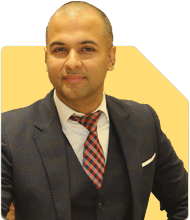Harsh Bharwani | Answer |Ask -Follow
Entrepreneurship Expert - Answered on Apr 10, 2023
As CEO and managing director, he leads the international business and employability initiatives at the computer networking institute, Jetking Infotrain Limited.
After graduating from Delhi University, Bharwani joined the family business in 2010 and set up operations in the US and Vietnam.
He has trained over three lakh students in employability, confidence and key life skills.... more

I'm 22 undergraduate a cricketer and not finding anything to do in my career I've searched internet like everything but still I'm confused and do not have any financial help totally on road plzz guide me
Firstly, it's essential to identify your skills, interests, and passions. As a cricketer, you may have developed skills such as teamwork, leadership, discipline, and perseverance. These skills are valuable in various fields, so it's worth exploring your options beyond cricket.
One possible avenue to consider is sports management or sports marketing, where you can apply your knowledge and passion for cricket to a business context. There are numerous opportunities in this field, such as event management, sponsorship, advertising, and media relations. You could start by interning at a sports marketing agency or reaching out to local sports teams to see if they have any opportunities.
Another option is to explore the world of digital marketing. With your familiarity with social media and online communication channels, you could consider learning skills such as search engine optimization, social media marketing, and content creation. Many companies, including those in the sports industry, are looking for individuals with strong digital marketing skills to help them reach and engage with their target audience.
Finally, you may want to consider continuing your education by pursuing a degree or certification in a field that interests you. This will not only give you the necessary knowledge and skills but also provide you with a network of professionals who can help guide you in your career.
Remember, it's okay to feel lost and unsure of your career path at this stage in your life. Take the time to explore your options and be open to new opportunities. With hard work and dedication, you can find a fulfilling career that aligns with your passions and interests.
You may like to see similar questions and answers below
Chocko Valliappa |544 Answers |Ask -Follow
Tech Entrepreneur, Educationist - Answered on Feb 20, 2024
Chocko Valliappa |544 Answers |Ask -Follow
Tech Entrepreneur, Educationist - Answered on Feb 23, 2024
Shekhar Kumar | Answer |Ask -Follow
Leadership, HR Expert - Answered on Apr 21, 2024
Patrick Dsouza |1429 Answers |Ask -Follow
CAT, XAT, CMAT, CET Expert - Answered on Apr 30, 2024
Ramalingam Kalirajan |10906 Answers |Ask -Follow
Mutual Funds, Financial Planning Expert - Answered on Dec 19, 2025
Nayagam P P |10859 Answers |Ask -Follow
Career Counsellor - Answered on Dec 19, 2025
Ramalingam Kalirajan |10906 Answers |Ask -Follow
Mutual Funds, Financial Planning Expert - Answered on Dec 19, 2025
Ramalingam Kalirajan |10906 Answers |Ask -Follow
Mutual Funds, Financial Planning Expert - Answered on Dec 19, 2025
Ramalingam Kalirajan |10906 Answers |Ask -Follow
Mutual Funds, Financial Planning Expert - Answered on Dec 19, 2025
Radheshyam Zanwar |6751 Answers |Ask -Follow
MHT-CET, IIT-JEE, NEET-UG Expert - Answered on Dec 19, 2025
Radheshyam Zanwar |6751 Answers |Ask -Follow
MHT-CET, IIT-JEE, NEET-UG Expert - Answered on Dec 19, 2025
Samraat Jadhav |2514 Answers |Ask -Follow
Stock Market Expert - Answered on Dec 18, 2025
Reetika Sharma |432 Answers |Ask -Follow
Financial Planner, MF and Insurance Expert - Answered on Dec 18, 2025
Reetika Sharma |432 Answers |Ask -Follow
Financial Planner, MF and Insurance Expert - Answered on Dec 18, 2025


























